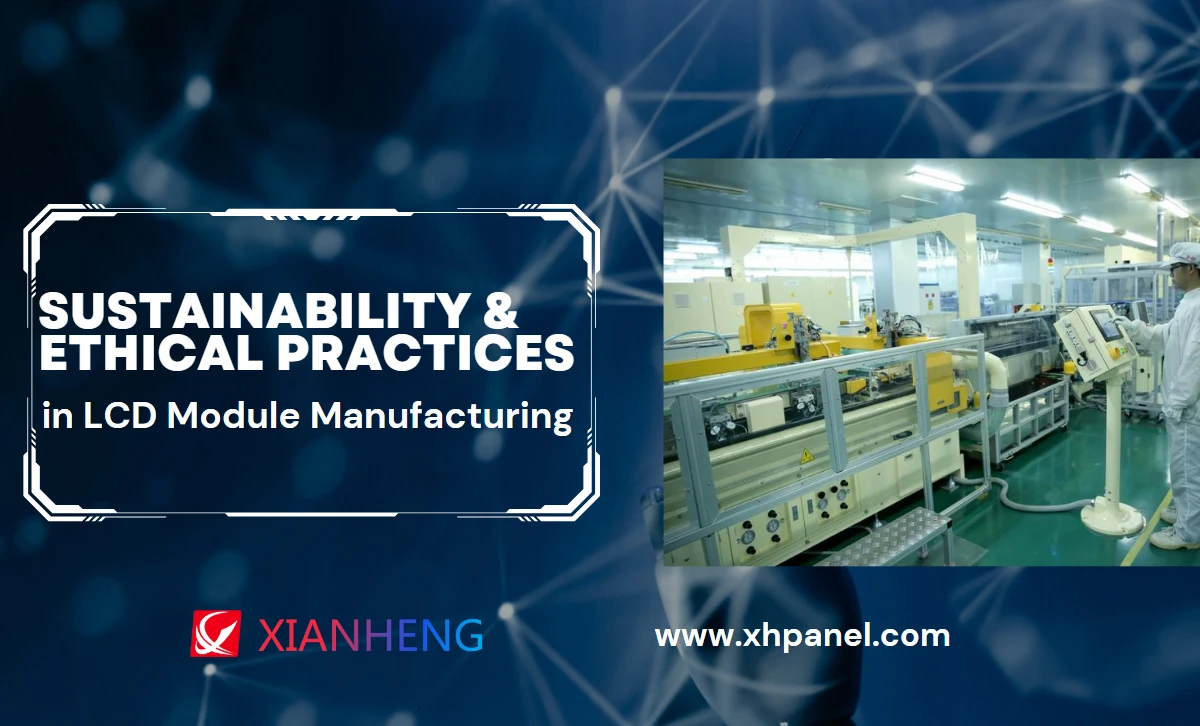Explore the world of sustainable and ethical LCD module manufacturing, from environmental initiatives to fair labor practices and regulatory compliance.
Introduction
Uncover the essential elements that drive sustainability and ethical practices in the manufacturing of LCD modules, and their significance in today's world.

Ⅰ. Supplier's Environmental Initiatives
Explore the commitment of LCD module manufacturers to environmental sustainability through various initiatives.
1. Embracing Renewable Energy Sources
Discover how manufacturers are shifting towards renewable energy sources to power their production facilities, reducing their carbon footprint and environmental impact.
2. Waste Reduction and Recycling
Learn about comprehensive waste management programs that aim to minimize waste generation, promote recycling, and contribute to a greener planet.
Ⅱ. Ethical Sourcing and Fair Labor Practices
1. Efficient Resource Utilization
Understand how efficient resource utilization, from water to materials, is a key focus area in sustainable LCD module manufacturing.
2. Ethical Sourcing and Fair Labor Practices
Delve into the principles of ethical sourcing and fair labor practices that ensure responsible and humane LCD module production.
3. Fair Labor Standards
Learn how LCD module manufacturers prioritize fair labor standards, providing employees with safe working conditions, fair wages, and
reasonable working hours.
4. Transparent Supply Chains
Explore how transparency in the supply chain ensures that materials are ethically sourced, upholding social responsibility and consumer trust.
5. Support for Local Communities
Understand the role manufacturers play in supporting local communities through education, healthcare, and employment opportunities.
Ⅲ. RoHS and REACH Compliance
Uncover the importance of RoHS and REACH compliance in LCD module manufacturing, safeguarding both consumers and the environment.
1. RoHS Compliance
Explore how RoHS regulations restrict the use of hazardous substances in LCD modules, ensuring their safety and environmental responsibility.
2. REACH Compliance
Learn about REACH regulations and their role in the safe use and management of chemical substances in LCD module production.
Conclusion
In an era where ethical and sustainable practices are imperative, discover how LCD module manufacturers are not only meeting but exceeding these standards. Their commitment not only reflects a moral responsibility but also positions them as leaders in providing eco-friendly and ethically produced LCD modules.

FAQs
1. What are RoHS and REACH compliance, and why are they crucial for LCD modules?
RoHS and REACH compliance ensures that LCD modules are free from hazardous substances, protecting both users and the environment.
2. How do LCD module manufacturers contribute to renewable energy use?
Manufacturers are increasingly adopting renewable energy sources to power their facilities, reducing their environmental impact.
3. Why is transparency in the supply chain important for ethical sourcing?
Transparency ensures that materials used in LCD modules are ethically sourced, upholding social responsibility and consumer trust.
4. What are the benefits of fair labor standards in LCD module manufacturing?
Fair labor standards ensure safe working conditions, fair wages, and reasonable hours, leading to a happy and productive workforce.
5. How do LCD module manufacturers support local communities?
Manufacturers often invest in local communities through education, healthcare, and employment opportunities.
6. What are the key components of waste management programs in LCD module manufacturing?
Waste management programs focus on waste reduction, recycling, and efficient resource utilization.
7. How do RoHS and REACH regulations impact LCD module production?
These regulations restrict the use of hazardous substances and ensure the safe use of chemicals in manufacturing.
8. What steps are taken to ensure efficient resource utilization in LCD module manufacturing?
LCD module manufacturers optimize resource utilization, from water to materials, through advanced technologies and processes.
9. What role does renewable energy play in reducing the carbon footprint of LCD module production?
Renewable energy sources help manufacturers reduce their reliance on fossil fuels, decreasing their environmental impact.
10. Why is transparency in the supply chain important for consumers?
Transparency allows consumers to make informed choices and supports accountability within the industry.

